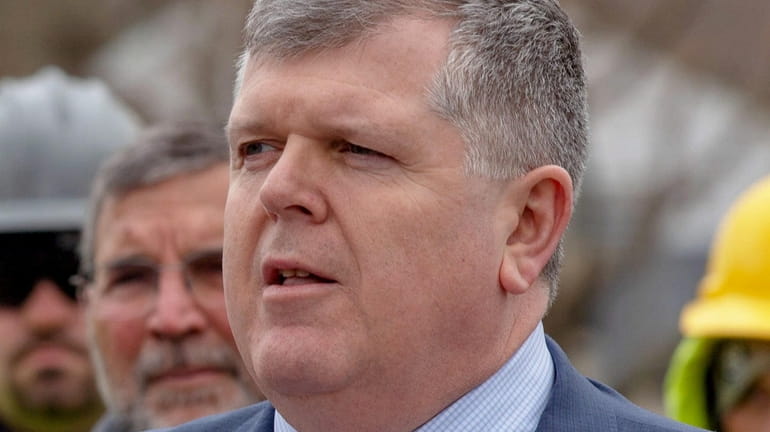One toke over the (town) line

Town of Babylon Supervisor Rich Schaffer is a life coach at a local drug recovery facility. Credit: Shelby Knowles
Rich Schaffer, Babylon's supervisor, freaked at overhearing town workers celebrating New York' State's new law legalizing weed, signed March 31 by Gov. Andrew M. Cuomo.
"They were like, 'Yeah, we can smoke' — and I'm like, 'Whoa, whoa, whoa!'" Schaffer said Friday, recalling a conversation with workers during a retirement party at the town's highway yard.
"Cuomo's signature wasn't even dry when all of the talk started," Schaffer said. "I had to explain, yeah, smoking marijuana is legal, but you can lose your jobs."
Highway department workers have special licensing that allows them to handle payloaders, drive garbage trucks and operate other heavy machinery.
They also are subject to random drug testing.
"You don't want to smoke on a Saturday night and find out Monday that you're scheduled for a test," Schaffer said.
Still, marijuana use and the workplace is just one of myriad issues that local officials will have to sort out as a result of the change in law.
On Wednesday, town supervisors and city mayors from Nassau and Suffolk gathered on Zoom to discuss what should happen now, and down the line, as the law's provisions go into effect.
Under the law, New Yorkers 21 and older can possess up to three ounces of recreational marijuana, at home or outside.
Smoking is allowed almost anywhere where smoking tobacco is allowed.
A ban on smoking in restaurants and taverns under the state clean air act is supposed to keep recreational use out of those establishments as well.
But Schaffer said he and some other town and city leaders already are scouring local ordinances to determine whether any quick updates may be necessary to specify that marijuana use cannot occur on the grounds of public town facilities, including parks and playgrounds.
Law enforcement officials on Long Island already are dealing with other aspects of the law.
District attorney offices in Nassau and Suffolk counties have vacated more than 2,500 bench warrants and arrests for low-level marijuana-related charges.
The Suffolk County Police Department said in a statement it would enforce the law.
Patrick Ryder, Nassau's police commissioner and a longtime opponent of legalizing marijuana, said his department would do the same.
"I personally strongly disagree with the legalization and use of marijuana; however, when it comes to the law I will abide by it and enforce it," Ryder said in a statement.
" ... My main concern at this time is how to test for it when someone has been operating a motor vehicle while impaired by it and keeping our residents safe. Only time will tell what effect this new law will have on our residents."
Schaffer shares some of Ryder's concerns. So does Jeffrey Reynolds, president and chief executive of the Family and Children's Association, a nonprofit based in Mineola.
"Long Island will have to grapple with a lot of policies now, and down the line, as portions of the law about allowing retail sales, and locations where recreational marijuana can be used go into effect," Reynolds said.
He said he was concerned about a range of issues: Use by children and teens; advertising; siting of retail establishments; use by pregnant and breastfeeding women; and the potential for residents with mental health issues to self-medicate with the drug.
Like Ryder, Reynolds also is concerned about the lack of any testing protocol to determine whether a driver is impaired by marijuana.
However, Reynolds and Schaffer are realists about marijuana usage.
"One problem that we have to grapple with is that we have lied to children about drug use by equating marijuana with opioids, and they know we've been lying," Reynolds said.
"So the challenge is how do we educate, how do we get teens and children to listen," he said.
Schaffer, who is a life coach at a local drug recovery facility, agrees.
"I have heard from people who are trying to get their life together who say they started with marijuana," he said, "And I got a call from someone who said, "What, are you kidding? Marijuana should be legal!"
The change in state law moots the debate.
Municipalities will have until the end of 2021 to decide whether to opt out of allowing retail sales, although that aspect of the law likely won't go into effect until 2022.
If towns opt out, they can opt back in later, after seeing how retail sales work out in other areas.
If they allow retail sales, however, there is no easy way to go back.
During Wednesday's meeting of town and city officials, there was discussion of opting out, Schaffer said.
But he and others noted a downside.
"There are issues with fentanyl and other dangerous drugs being added to marijuana," Schaffer said. "If the state is licensing, in theory, they will be overlooking the product."
Municipalities also stand to gain a windfall of new revenue from retail recreational marijuana sales.
Reynolds said he once favored high taxes on the drug, but is reexamining that view.
"Tax it too low and there is less money coming in, but tax it too high and people will go to the black market," Reynolds said.
Should Babylon ultimately opt in, Schaffer said, he would put the town's share of marijuana revenue into a "lockbox that would be used for education, treatment programs and such."
Town and city leaders are slated to have another Zoom meeting in about three weeks.
A decision about opting out or staying in won't be easy, Reynolds pointed out.
"This is Long Island," he said. "Ask people whether they support recreational use and they will say yes. Ask if they want a pot store in the neighborhood and they will say no."

